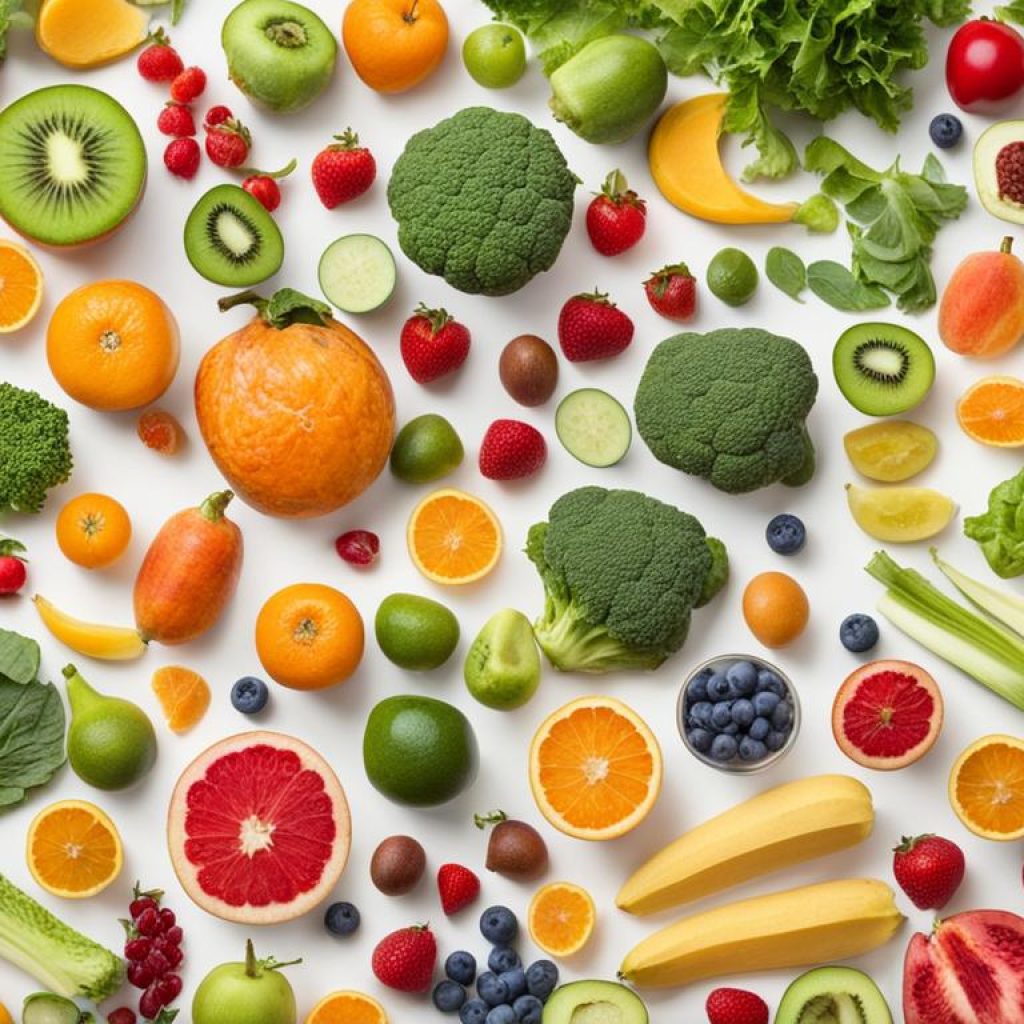Welcome to our journey into the world of health food! Through this article, we will explore how incorporating health food into your diet can promote overall wellness and vitality. In today’s fast-paced world, it’s essential to fuel your body with the right nutrients to maintain a healthy lifestyle.
Health food refers to any food that is considered healthy and promotes optimal health and wellbeing. This type of food is typically nutrient-dense and packed with essential vitamins and minerals.
Our bodies require essential nutrients to function correctly, and health food provides us with a variety of these nutrients. By incorporating health food into our diets, we are promoting optimal health and wellness, which translates to increased vitality and longevity.
Key Takeaways:
- Health food promotes optimal health and wellbeing.
- Health food is typically nutrient-dense and packed with essential vitamins and minerals.
- Our bodies require essential nutrients to function correctly, and health food provides us with a variety of these nutrients.
- Incorporating health food into our diets promotes optimal health and wellness, increasing vitality and longevity.
What is Health Food?
When it comes to maintaining a healthy lifestyle, incorporating health food into your diet is essential. But what exactly does health food mean?
Health food can be defined as any food that contains essential nutrients, vitamins, and minerals needed for the overall well-being of the body. These can include fresh fruits and vegetables, whole grains, lean proteins, and plant-based alternatives.
Unlike processed foods, health foods are minimally processed and contain no artificial additives or preservatives. They are also low in saturated fats, sodium, and refined sugars, making them ideal for maintaining a healthy weight and reducing the risk of chronic diseases such as diabetes, heart disease, and cancer.
At the core of health food is the idea of providing your body with the necessary fuel to function at its best. By eating a balanced diet that includes a variety of health foods, you can ensure that you are meeting your nutritional needs and supporting your body’s natural processes.
Essential Nutrients in Health Food
Health food is rich in essential nutrients that are vital for maintaining good health and wellbeing. Essential nutrients are a group of nutrients that the body needs, but cannot produce on its own, so they must be obtained through a healthy diet or supplements.
Some of the essential nutrients found in health food include:
Vitamins
Vitamins are organic compounds that the body needs in small amounts to function properly. Health food is an excellent source of vitamins, including vitamin A, vitamin C, vitamin D, vitamin E, and the B vitamins.
| Vitamin | Function | Sources |
|---|---|---|
| Vitamin A | Helps with vision, immune function, and skin health | Sweet potatoes, carrots, spinach, mangos, and red peppers |
| Vitamin C | Assists with collagen production,immune system function, and wound healing | Oranges, strawberries, kiwi, bell peppers, broccoli, and kale |
| Vitamin D | Aids in bone health and immune function | Sunlight, fatty fish, mushrooms, and fortified foods |
Minerals
Minerals are inorganic substances that the body needs for various processes. Health food is a rich source of minerals, including calcium, iron, magnesium, potassium, and zinc.
| Mineral | Function | Sources |
|---|---|---|
| Calcium | Helps build and maintain strong bones and teeth | Cheese, yogurt, milk, and fortified foods |
| Iron | Assists with oxygen transport and immune system function | Red meat, turkey, beans, and fortified cereals |
Antioxidants
Antioxidants are compounds that protect the body against oxidative stress. Health food is abundant in antioxidants, including beta-carotene, lycopene, and flavonoids.
Fiber
Fiber is a type of carbohydrate that the body cannot digest. Health food is a great source of fiber, which helps support digestive health, reduce cholesterol levels, and control blood sugar levels.

We can obtain essential nutrients by incorporating health food into our diet. By consuming a variety of fruits, vegetables, whole grains, lean proteins, and plant-based alternatives, we can ensure that we are getting all of the necessary vitamins, minerals, antioxidants, and fiber that our body needs to thrive.
Incorporating Health Food into Your Diet
Are you looking to add more health food choices to your diet, but wondering how to do it? Incorporating health food into your daily nutrition plan can be easier than you think with a few simple changes. Here are some tips to help you get started:
1. Start your day with a nutritious breakfast
Breakfast is an essential meal of the day, and it’s an excellent opportunity to incorporate health food into your diet. Swap out your sugary cereal for a bowl of oatmeal topped with fresh fruit or a spinach omelet with whole-grain toast.
2. Get creative with your snacks
Instead of reaching for a bag of chips or candy bars during snack time, opt for healthier alternatives. Some great choices include baby carrots, apples with peanut butter, or a handful of almonds.
3. Experiment with different kinds of vegetables
Vegetables are an excellent source of nutrients and fiber, and there are many ways to prepare and season them to make them more delicious. Try roasting or grilling vegetables like zucchini, brussels sprouts, and sweet potatoes.
4. Incorporate whole grains into your diet
Whole grains are a great source of fiber and can be found in foods like brown rice, quinoa, whole-grain pasta, and bread. Swap out refined grains for whole grains in your diet to promote heart health and digestion.
5. Meal planning and mindful eating
Meal planning can help you stay on track with your health food choices. Take some time at the beginning of the week to plan your meals, and prepare some healthy snacks ahead of time. Practicing mindful eating can also help you savor your food and recognize when you are full.
By incorporating more health food choices into your diet, you can improve your overall health and wellbeing. With these tips, you can make simple changes to your eating habits and enjoy a variety of nutritious and delicious foods.
Conclusion
In conclusion, incorporating health food into your daily diet is an excellent way to nourish your body and promote overall wellness. By consuming a variety of fruits, vegetables, whole grains, lean proteins, and plant-based alternatives, you can provide your body with the essential nutrients it needs to function optimally.
Remember, small changes can lead to significant results. Whether it’s adding a serving of vegetables to your meals or swapping out sugary snacks for a piece of fruit, every step you take towards incorporating health food into your diet is a step towards better health.
So, let’s start exploring the world of health food together and begin nourishing our bodies for a happier and healthier life.
FAQ
What is health food?
Health food refers to a category of foods that are considered to be beneficial for one’s health due to their nutrient content. These foods are typically natural or minimally processed and contain a high concentration of essential nutrients, such as vitamins, minerals, and antioxidants.
Why is health food important?
Health food is important because it provides the body with the necessary nutrients it needs to function optimally. A diet rich in health food can help maintain a healthy weight, boost the immune system, reduce the risk of chronic diseases, and promote overall well-being.
What are some examples of health foods?
Examples of health foods include fruits, vegetables, whole grains, lean proteins (such as chicken, fish, and tofu), nuts and seeds, and plant-based alternatives like legumes and soy products. These foods are nutrient-dense and provide a wide range of vitamins, minerals, and antioxidants.
How can I incorporate health food into my daily diet?
There are several ways to incorporate health food into your daily diet. Start by adding more fruits and vegetables to your meals and snacks. Choose whole grains instead of refined grains and opt for lean proteins. Experiment with new recipes and try incorporating plant-based alternatives into your meals. Gradually replace unhealthy snacks with nuts, seeds, or yogurt. Lastly, prioritize mindful eating and meal planning to ensure a balanced and nutritious diet.
Can health food help with weight management?
Yes, health food can play a crucial role in weight management. Since health foods are generally lower in calories, higher in fiber, and more nutrient-dense, they can help reduce overall calorie intake while providing essential nutrients. Additionally, a diet rich in health food can help control cravings, promote satiety, and support a healthy metabolism.




0 Comments